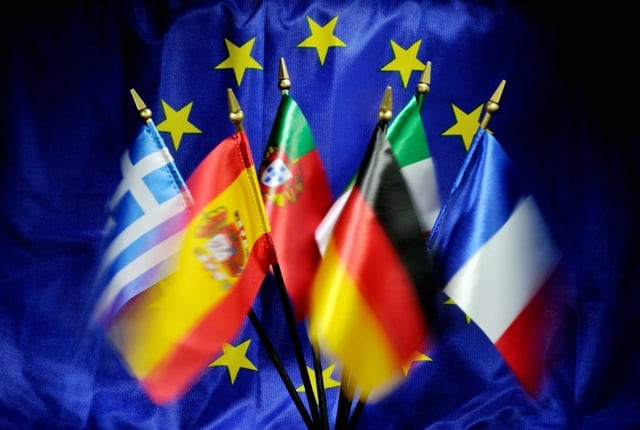Despite debt crisis, France hopes EU will remain intact
Ambassador insists EU is still the world’s largest trading bloc.

Despite debt crisis, France hopes EU will remain intact
As some British politicians considered holding a referendum on whether the United Kingdom should stay in the European Union (EU) – a 27-member economic and political bloc of European nations – French Ambassador to Pakistan Philippe Thiebaud on Thursday said he expected the EU to remain intact in coming years.
“Many a Cassandra has predicted that the EU will disintegrate. But statistics reflect a different trend. Despite the ongoing downturn in the EU, it is still the world’s largest trading bloc and contributes the highest share to the global gross domestic product (GDP),” Thiebaud told The Express Tribune in an interview.
According to the World Bank, the EU’s GDP in 2011 was $17.5 trillion, which was 25% of the global GDP of $69.9 trillion in the same year, making it the largest economic powerhouse of the world.
The EU’s fiscal integration is in danger because of the ongoing sovereign debt crisis in the eurozone – a monetary union of 17 EU member states that share the euro as the single currency – in general and Greece in particular. Austerity measures adopted reluctantly to strengthen fiscal discipline have led to massive protests in Greece.
“We overestimated the capacity of the euro. But we’ve now agreed to mechanisms to fix it,” Thiebaud said while referring to the $649 billion bailout fund mobilised by Germany to pull Greece out of the debt crisis.
Amidst nationwide riots and general strikes, the Greek parliament backed more austerity measures on Wednesday to pave the way for the release of the next $40.15 billion instalment of bailout loans.
Saying it took many decades for the dollar to become the common currency in the United States, the French ambassador noted that the euro became official just 11 years ago. “Debates are going on to fine-tune these mechanisms. We want to ensure that public spending is reduced, but investments in research and development, science and technology are increased simultaneously,” he said.
The monetary interdependence in the eurozone means that member countries do not have the freedom to print money if they are unable to meet their fiscal commitments. One of the possible consequences of assorted economies forming a monetary union is what economists describe as a bank run – a condition when a large number of depositors withdraw their money at once fearing insolvency of financial institutions.
A deposit freeze to convert euro deposits into drachmas will be inevitable in case Greece decides to leave the eurozone. No wonder, Greek depositors realise that the value of their deposits in a Greek bank is different from that in a German bank.
“It’s indeed a tough time for Greece. It doesn’t export much. It needs a competitive boost so it can export more,” Thiebaud said. “It’s in favour of all stakeholders that the EU stays as an integrated economic bloc,” he added.
Published in The Express Tribune, November 9th, 2012.



















COMMENTS
Comments are moderated and generally will be posted if they are on-topic and not abusive.
For more information, please see our Comments FAQ